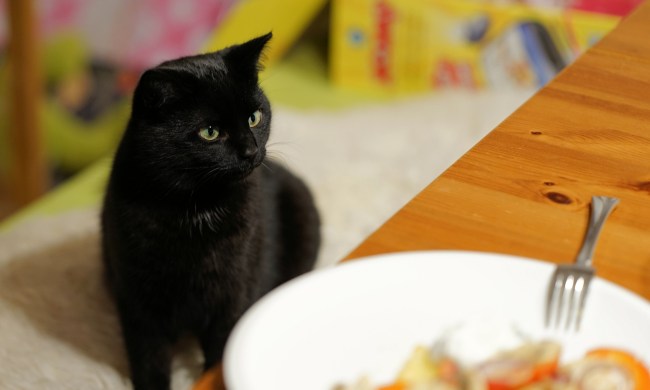There are plenty of reasons your cat should be an indoor cat — it keeps them safe from parasites and diseases (not to mention traffic or getting lost and not being able to find their way home). It also means you’re less likely to find “gifts” of dead mice and birds in your recently cleaned living room.
One other thing you don’t have to deal with if you have an indoor cat? Your pet interacting with outdoor animals… unless they come onto your porch, that is. We all know dogs aren’t usually fond of squirrels (after all, there’s even a TV Tropes page about it), but this video isn’t about Fido; this time, it’s cat vs. squirrel.
Set to the background noise of the cat’s pet parents’ laughter as well as an old episode of The Office (we don’t imagine Angela would find any of this funny though), this brazen squirrel practically dares the poor kitty to catch them (knowing full well they’re safely behind both a mesh screen and a glass door). As Redditor WasteCan6403 put it, “That squirrel knows he’s untouchable.”
Still, this poor cat valiantly stalks its prey, following its movement across the screen door, and even getting in a couple of good jumps (if only that pesky glass wasn’t in the way).
Some Redditors were convinced a dog would have gone even more berserk. Redditor mimzynull said, “My doggo would have gone straight through the glass and mortally injured herself to try to get that squirrel… Cats are so much more chill.”
Meanwhile, Redditor haumea_jouhikko noted that cats can be just as wild. “My cat would 100% have gone through that window,” they said. “All 10 kg of chonk would never be allowed to see that squirrel.”
While both cats and dogs have a reputation for chasing squirrels, we think haumea_jouhikko has a good point — regardless of what type of pet you have, if you think there’s a chance your dog or cat might try to break glass to get to a squirrel, maybe it’s time to invest in some curtains.
While the focus of this video was on the cat’s standoff with the squirrel, one eagle-eyed Redditor did notice another enemy of the kitty. Redditor qinghairpins queried whether the cat’s hammock was being used for plants, and DarkNovella, who posted the video, answered in the affirmative.
“She tries to eat them if I put them anywhere within her reach,” they explained. “To the right, she has a massive cat tower so she’s not too upset about it.”
Cats are great, but they do have a tendency to try to eat anything from plants to squirrels if given the chance. Want to keep them safe (and sane)? “Out of sight” is a good rule for pet parenting.


